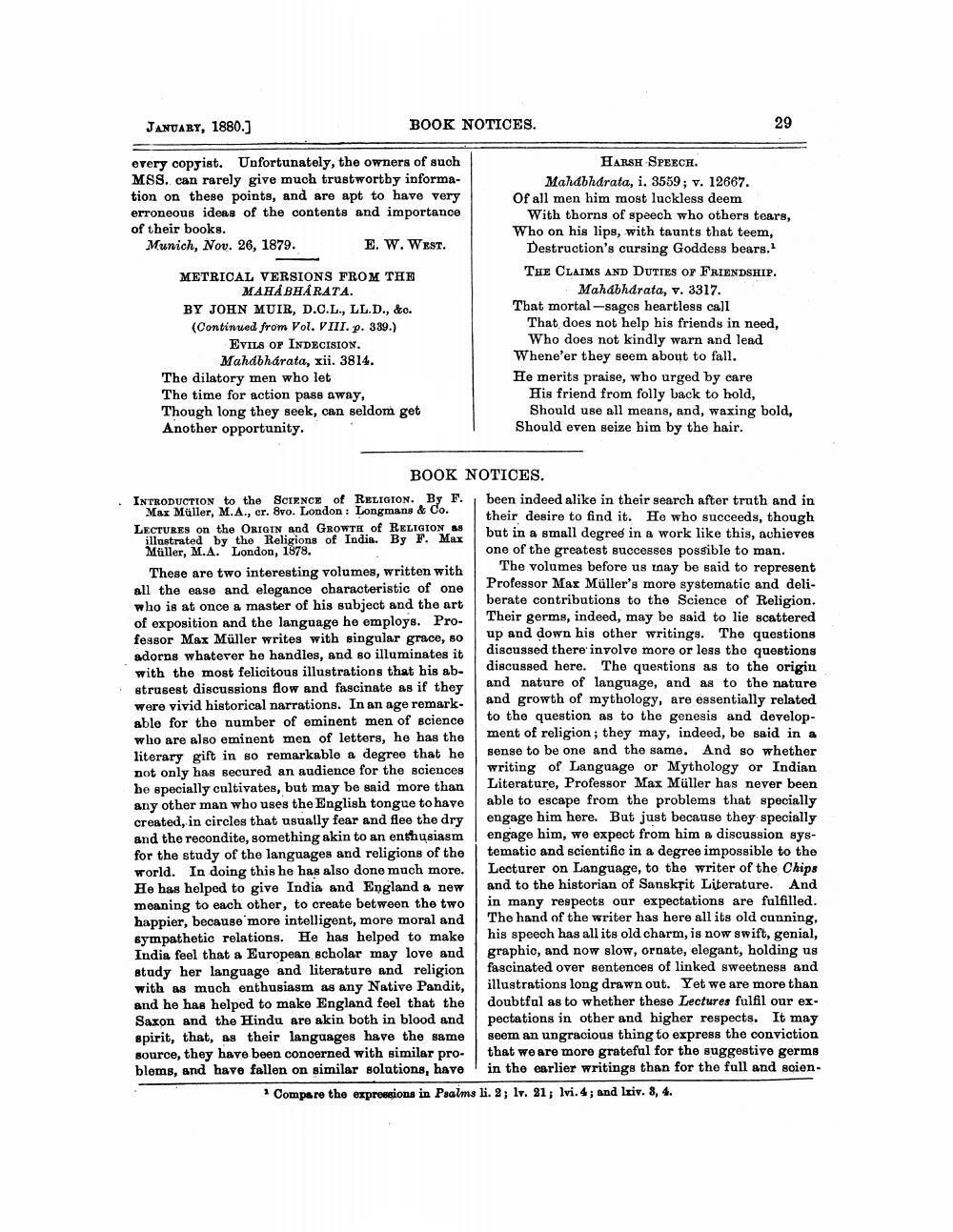________________
JANUARY, 1880.)
BOOK NOTICES.
every copyist. Unfortunately, the owners of such MSS. can rarely give much trustworthy information on these points, and are apt to have very erroneous ideas of the contents and importance of their books.
Munich, Nov. 26, 1879. E. W. WEST.
METRICAL VERSIONS FROM THE
MAHABHARATA. BY JOHN MUIR, D.C.L., LL.D., &c. (Continued from Vol. VIII. p. 389.)
EVILS OF INDECISION.
Mahdbharata, xii. 3814. The dilatory men who let The time for action pass away, Though long they seek, can seldom get Another opportunity.
HARSH SPEECH. Mahdbharata, i. 3559; v. 12667. Of all men him most luckless deem
With thorns of speech who others tears, Who on his lips, with taunts that teem,
Destruction's cursing Goddess bears. THE CLAIMS AND DUTIES OF FRIENDSHIP.
Mahabharata, v. 3317. That mortal -sages heartless call
That does not help his friends in need,
Who does not kindly warn and lead Whene'er they seem about to fall. He merits praise, who urged by care
His friend from folly back to hold,
Should use all means, and, waxing bold, Should even seize him by the hair.
BOOK NOTICES. INTRODUCTION to the SCIENCE of RELIGION. By F. been indeed alike in their search after truth and in Max Müller, M.A., cr. 8vo. London: Longmans & Co.
their desire to find it. He who succeeds, though LECTURES on the ORIGIN and GROWTH of RELIGION as illustrated by the Religions of India. By F. Max
but in a small degree in a work like this, achieves Müller, M.A. London, 1878.
one of the greatest successes possible to man. These are two interesting volumes, written with
The volumes before us may be said to represent all the ease and elegance characteristic of one
Professor Max Müller's more systematic and deliwho is at once a master of his subject and the art
berate contributions to the Science of Religion. of exposition and the language he employs. Pro
Their germs, indeed, may be said to lie scattered fessor Max Müller writes with singular grace, 80
up and down his other writings. The questions adorns whatever he handles, and so illuminates it
discussed there involve more or less tho questions with the most felicitous illustrations that his ab
discussed here. The questions as to the origin strusest discussions flow and fascinate as if they
and nature of language, and as to the nature were vivid historical narrations. In an age remark
and growth of mythology, are essentially related able for the number of eminent men of science
to the question as to the genesis and developwho are also eminent men of letters, he has the ment of religion; they may, indeed, be said in a literary gift in so remarkable a degree that he sense to be one and the same. And so whether not only has secured an audience for the sciences writing of Language or Mythology or Indian he specially cultivates, but may be said more than
Literature, Professor Max Müller has never been any other man who uses the English tongue to have able to escape from the problems that specially created, in circles that usually fear and flee the dry engage him here. But just because they specially and the recondite, something akin to an enthusiasm engage him, we expect from him a discussion sysfor the study of the languages and religions of the tematic and scientific in a degree impossible to the world. In doing this he has also done much more. Lecturer on Language, to the writer of the Chips He has helped to give India and England a new and to the historian of Sanskrit Literature. And meaning to each other, to create between the two in many respects our expectations are fulfilled. happier, because more intelligent, more moral and
The hand of the writer has here all its old cunning, sympathetic relations. He has helped to make his speech has all its old charm, is now swift, genial, India feel that a European scholar may love and graphio, and now slow, ornate, elegant, holding us study her language and literature and religion fascinated over sentences of linked sweetness and with as much enthusiasm as any Native Pandit, illustrations long drawn out. Yet we are more than and he has helped to make England feel that the doubtful as to whether these Lectures fulfil our ex. Saxon and the Hindu are akin both in blood and pectations in other and higher respects. It may spirit, that, as their languages have the same seem an ungracious thing to express the conviction source, they have been concerned with similar pro- that we are more grateful for the suggestive germs blems, and have fallen on similar solutions, have in the earlier writings than for the full and scien
* Compare the exprossions in Psalms li. 2; lv. 21, Ivi. 4; and lxiv. 3, 4.




